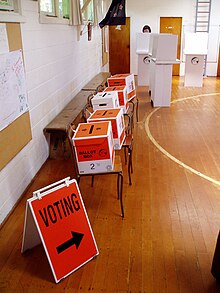Electoral system of New Zealand
The New Zealand parliamentary electoral system has been based on the principle of mixed-member proportional (MMP) since the 1996 election.
Under the MMP system, New Zealanders have two secret ballot votes to elect members of Parliament (MPs).
In contemporary New Zealand, generally all permanent residents and citizens aged 18 or older are eligible to vote.
The main exceptions include citizens who have lived overseas continuously for too long, and convicted persons who are detained in a psychiatric hospital or serving a prison term of more than three years.
In 1956, the term of three years was 'entrenched' in the Electoral Act which means that it can only be changed by achieving a majority in a national referendum or by a vote of 75% of all members of Parliament.
[3] In 2013 the Government established an advisory panel to conduct a review of constitutional issues – including an examination of the term of parliament.
Other issues discussed at public meetings held by the panel were the number of MPs New Zealand should have, whether a written constitution is needed, and whether all legislation should be consistent with the Bill of Rights Act.
[4] Both Prime Minister John Key and Opposition leader David Shearer expressed support for an extension of the parliamentary term to four years.
[5] The main argument put forward in support of a longer term is that "Governments need time to establish and then implement new policies".
An opinion poll on the news website Stuff in early 2013 found that of 3,882 respondents, 61% were in favour of changing to a four-year term.
[7] A unique feature of New Zealand's electoral system is that a number of seats in Parliament are reserved exclusively for Māori.
European colonists were quite happy with this state of affairs because, according to NZ History online, "they did not think Māori were yet 'civilised' enough to exercise such an important responsibility".
[8] At the time, Māori were dealing directly with the Crown in regard to the Treaty of Waitangi and had little interest in the 'pākehā parliament'.
After much debate, in 1867 Parliament passed the Maori Representation Act, which established four electorates solely for Māori.
It concluded that "separate seats had not helped Maori and that they would achieve better representation through a proportional party-list system".
The Commission recommended that if a mixed-member proportional (MMP) system was adopted, the Māori seats should be abolished.
[9] However, Māori continued to use a verbal system – whereby electors had to tell the polling official which candidate they wanted to vote for.
Electoral officials had always argued that it would be too difficult to register Maori voters (supposedly because of difficulties with language, literacy and proof of identity).
[15] In early colonial New Zealand, as in most Western countries, women were totally excluded from political affairs.
However, they were not allowed to stand as candidates until 1919, and the first female Member of Parliament (Elizabeth McCombs) was not elected until 1933[16] – 40 years later.
Although there have been three female Prime Ministers (Jenny Shipley, Helen Clark and Jacinda Ardern), women remain somewhat under-represented in Parliament.
With specific reference to decisions made by courts in Canada, Australia and South Africa, and by the European Court of Human Rights in respect of the United Kingdom, she pointed out that "every comparable overseas jurisdiction has had a blanket ban (against prisoners' voting) struck down in the last 10 years".
[20] In 2020, the Electoral Act was amended so that only persons serving a sentence of imprisonment for a term of three years or more are disenfranchised – this restores the law to the position prior to 2010.
This convention was upset by Robert Muldoon calling a snap election, which was held on Saturday 14 July 1984.
The exceptions were in 2011, which was held in November to avoid clashing with fixtures of the New Zealand-hosted Rugby World Cup, in 2020, which was delayed from the second-last Saturday of September due to the COVID-19 pandemic, and in 2023.
When smaller parties are widely predicted, through political opinion polling, to surpass the electoral threshold, there may be fewer imperatives for strategic voting.
The Commission released its proposal paper for consultation in August 2012, before publishing its final report on 29 October 2012.
In the report, the Commission recommended the following:[53] Parliament is responsible for implementing any changes to the system, which has been largely unchanged since it was introduced in 1994 for the 1996 election.
[54][55] In May 2014, Judith Collins and John Key said that there was no inter-party consensus on implementing the results of the Commission, so they would not introduce any legislation.
[56] In October 2021, the Labour government announced an independent review of New Zealand's electoral law, including aspects of the MMP system.

